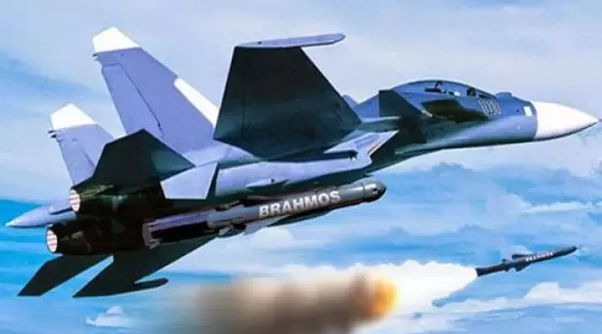Science & Technology
Sukhoi-30 MKI Equipped with the BrahMos Missile
- 21 Jan 2020
- 3 min read
Why in News
A squadron of fourth-generation fighter jets Sukhoi-30 MKI equipped with the BrahMos missile was inducted in the Southern Air Command, Thanjavur.
- The induction will help India to maintain its air and maritime dominance in the Indian Ocean Region (IOR).
- Sukhoi 30 jets have been modified to carry BrahMos air-to-surface missiles giving them the capacity to conduct long-range precision strikes.
Integration of Su-30 MKI and BrahMos
- Hindustan Aeronautics Limited (HAL) and BAPL (BrahMos Aerospace Pvt Ltd) in 2014 signed a contract to modify two Su-30 MKI aircraft for integrating with the missile.
- It was for the first time in the world that such a heavyweight missile was integrated on a fighter aircraft.
- All weather Brahmos gives the Sukhois a combat radius of almost 1,500 km without mid-air refuelling.
- Brahmos is the heaviest weapon to be deployed on Su-30 MKI fighter aircraft, with a weight of 2.5 tonnes.
BrahMos Missiles
- BrahMos missile is a supersonic cruise missile which features Indian propulsion system, airframe, power supply, and other major indigenous components.
- BrahMos is a joint venture between the Defence Research and Development Organisation of India (DRDO) and the NPOM of Russia.
- Brahmos is named on the rivers Brahmaputra and Moskva.
- It is a two-stage (solid propellant engine in the first stage and liquid ramjet in second) air to surface missile with a flight range of around 300 km.
- However, India's entry into the Missile Technology Control Regime (MTCR) has extended the range of the BrahMos missile to reach 450 km-600km.
- Brahmos is a multiplatform i.e it can be launched from land, air, and sea and multi capability missile with pinpoint accuracy that works in both day and night irrespective of the weather conditions.
- It operates on the "Fire and Forgets" principle i.e it does not require further guidance after launch.
- Brahmos is one of the fastest cruise missile currently operationally deployed with speed of Mach 2.8, which is 3 times more than the speed of sound.




